Tip to Toe on Vancouver Island
PeriBlog VI: Victoria, BC, Canada
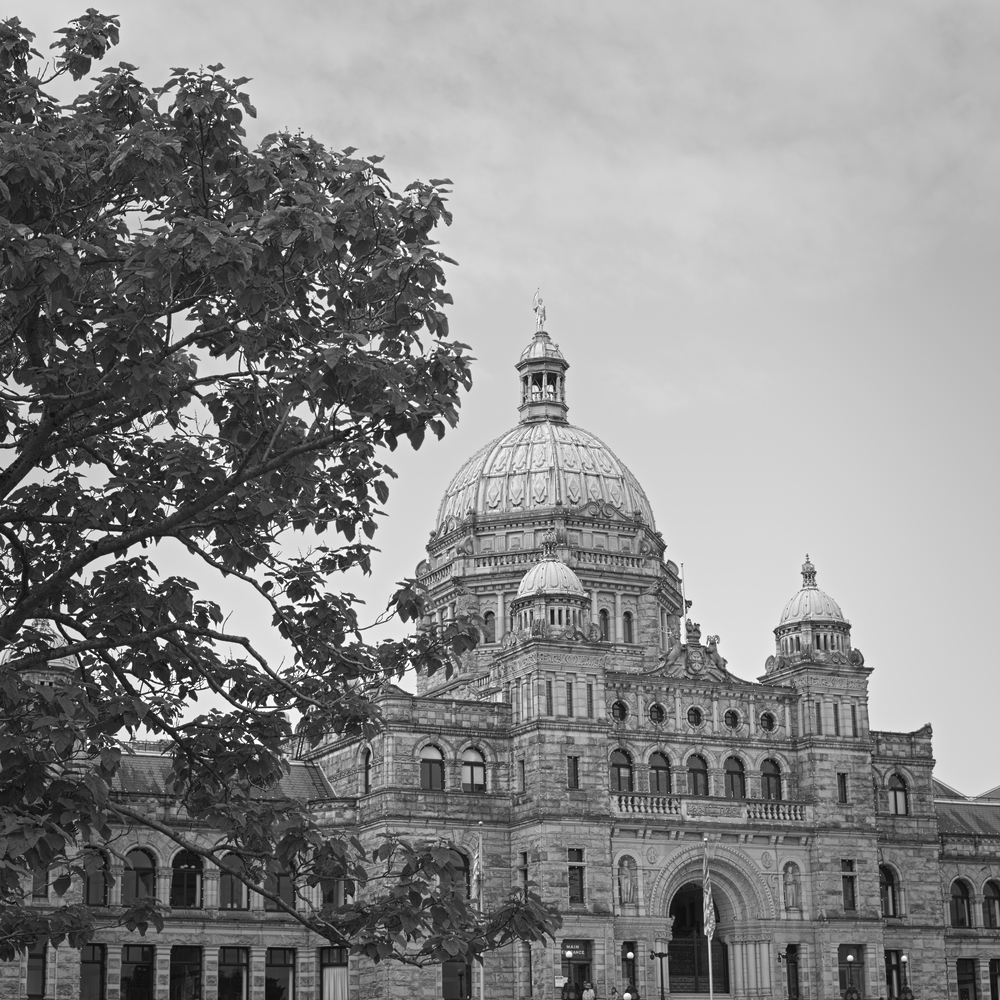
Capital building, Victoria, BC
Having traveled from tip to the toe of Vancouver Island, we have reached the final stop of our odyssey. Our journey has brought us to Victoria, largest city on the island and the capital of British Columbia.
The first morning is not propitious; the raucous cacophony of the local gull populations wakes us at 3:00 a.m. Hours before dawn, the white-winged squawk-boxes ramp up and announce that, since they are no longer sleeping, no one else should snooze either. It has been some time since last I heard their strident ululations. The ravens near Port McNeil are intensely territorial and they drive the white-winged disturbers of sleep away.
Victoria could use a local raven population.
Noise is, unsurprisingly, a major difference between this city and the rest of the island. Police sirens, the rumble of traffic, shouts from street level, the continuous clatter of workers throwing up a beer garden nearby, and, of course, gull squawks, collude to destroy the peace.
Our apartment is located near the Chinatown pickle boat dock, and each time one of these diminutive water taxis departs, it sounds a tri-beep salute on an annoying little horn.
Floating hot tubs also depart from the Chinatown dock. For reasons that exceed my limited comprehension, a local company rents wood-fired hot tubs that bathers can drive around the Inner Harbor while they soak their cares away.
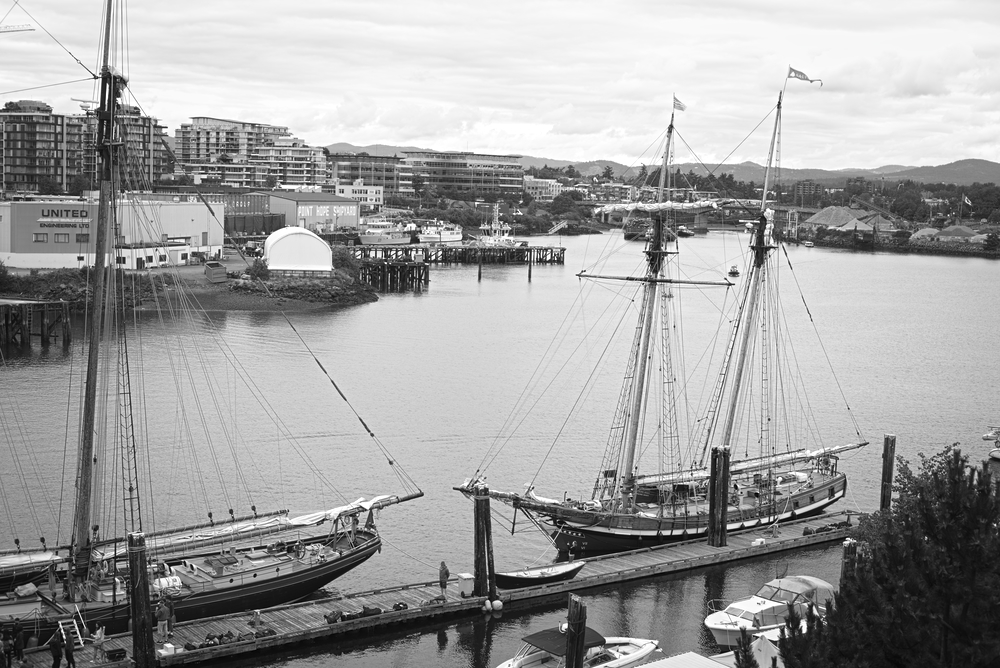
Chinatown Dock, home port of the floating hot tub
A romantic 90 minute cruise for two costs $200. Of course that amount includes the use of a Bluetooth speaker, a dry bag for possessions, and a complimentary bottle of water. Users must stoke the small wood stove that keeps the water warm.
I don’t understand the attraction, but the consistent flow of customers arriving ever afternoon suggests that I am hopelessly out of step with our age and the Canadian Zeitgeist. The company’s two units are in constant operation, bumbling around the harbor, dodging tug boats, barges, and float planes. There is a clear market for the floating hot tub.
Speaking of odd appeal, every Saturday and Sunday morning, the pickle boats gather in the inner harbor for the World Famous Water Taxi Ballet. As a giddy march throbs from speakers erected in front of the Parliament building, five pickle boats pass in formation, small pennants snapping in the breeze.

The World Famous Water Taxi Ballet
The boats spin on their keels, pass in line abreast formation, slide into trail formation, and then dodge each other in a five boat weave.
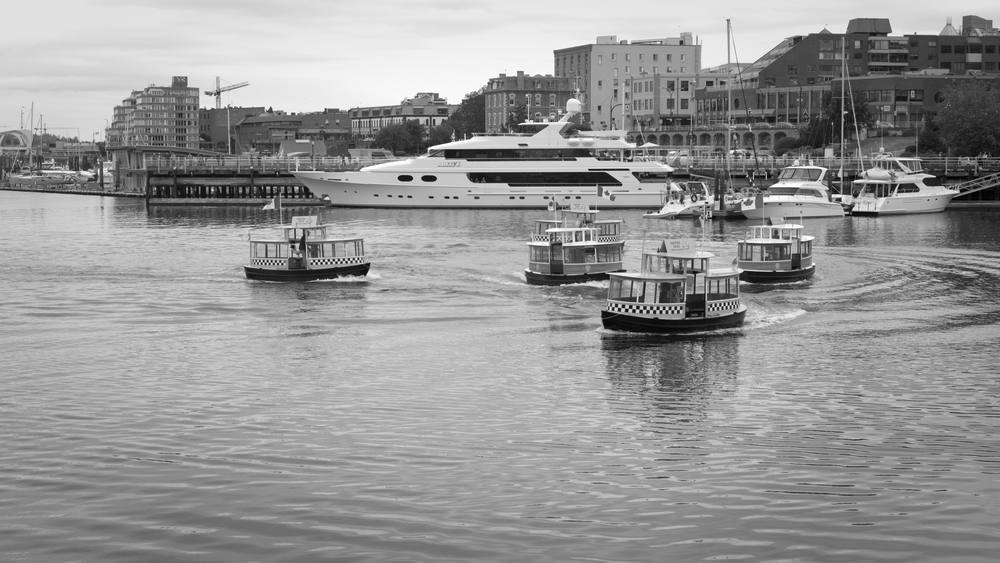
Pickle boats execute their world famous five boat weave
There’s a reason that this is world famous. It is like watching the Blue Angels riding turtles. What a spectacle!
Victoria is a young person’s town. The streets, especially in the central core, are packed with twenty-somethings drifting about. I’m not surprised; the lure of floating hot tubs is nearly irresistible. Not only that, but Victoria and southern Vancouver Island offer an absorbing palette of outdoor activities. From hiking to wind-surfing, rock-climbing to kayaking, there’s much here for the enthusiastic adventurer.
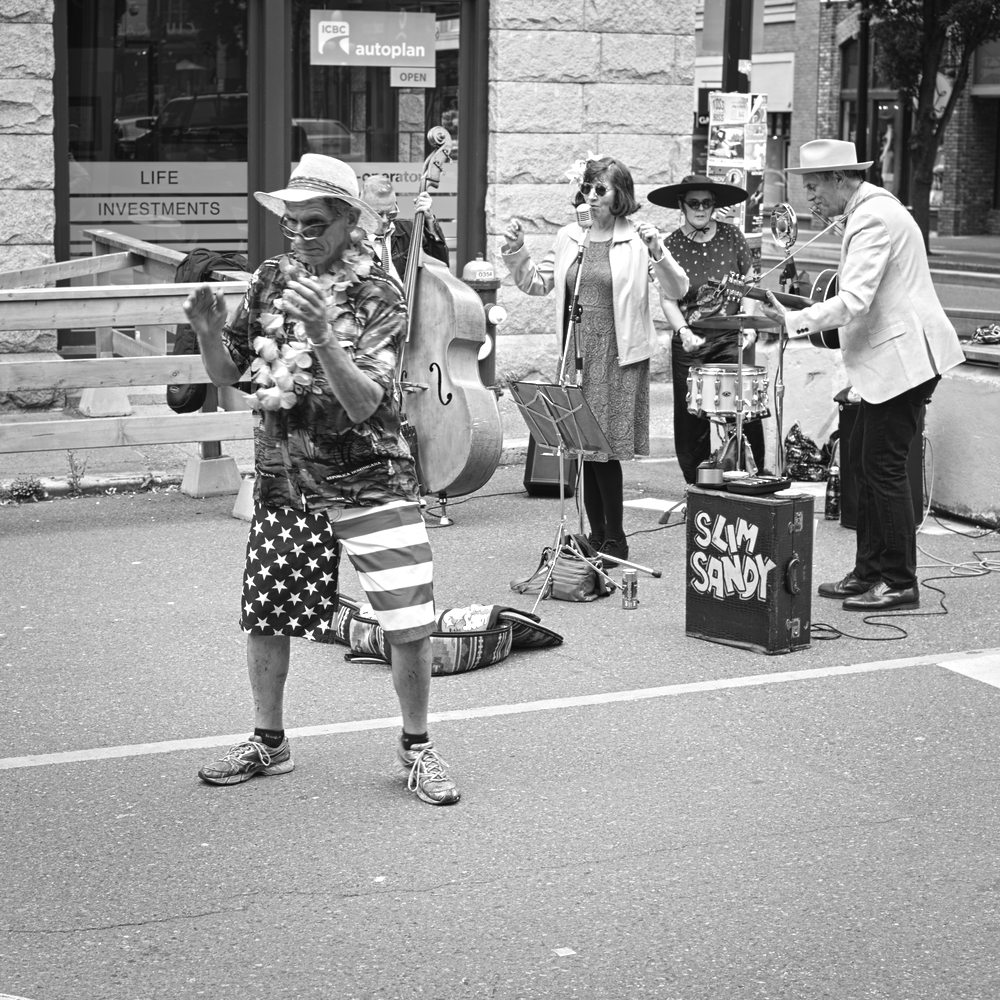
Of course not everyone is young in Victoria
If that seems too exhausting, one can approach nature on a whale-watching speed boat or simply take an evening cruise on a pickle boat. The city is edgy and progressive, the sort of place that if I was forty years younger I would want to settle in.

Chinatown, Victoria, BC
The last time we visited, I complained vigorously about the exorbitant price of the Royal BC Museum. In my mind—then and now—$24 per person is simply outrageous. Nevertheless, I did admire the native history displays and despite the exorbitant toll demanded by the trolls at the front gate, I resolved to bite my tongue and make a second visit.
I was charmed, upon arrival, to discover that the admission price had been slashed to $5. Someone in the museum administration must have read the scathing condemnation of ticket prices I had written in my earlier series—the Salish Sojourn—and taken action.
Three cheers for the power of the press!
Unfortunately, I soon learned that my critique was not a factor in the price reduction. The museum has temporarily lowered its prices because the entire third floor—which contains the First Nations materials I’d hoped to see—is closed for renovation.
What a disappointment.
The museum did have an interesting exhibit on the internment of Japanese Canadians during World War II. I had thought that the imprisonment of loyal citizens was restricted to the United States, but, in fact, the Canadians were harsher than down south. Even after the war ended, the Canadian government refused to allow its citizens of Japanese descent to return to coastal regions.
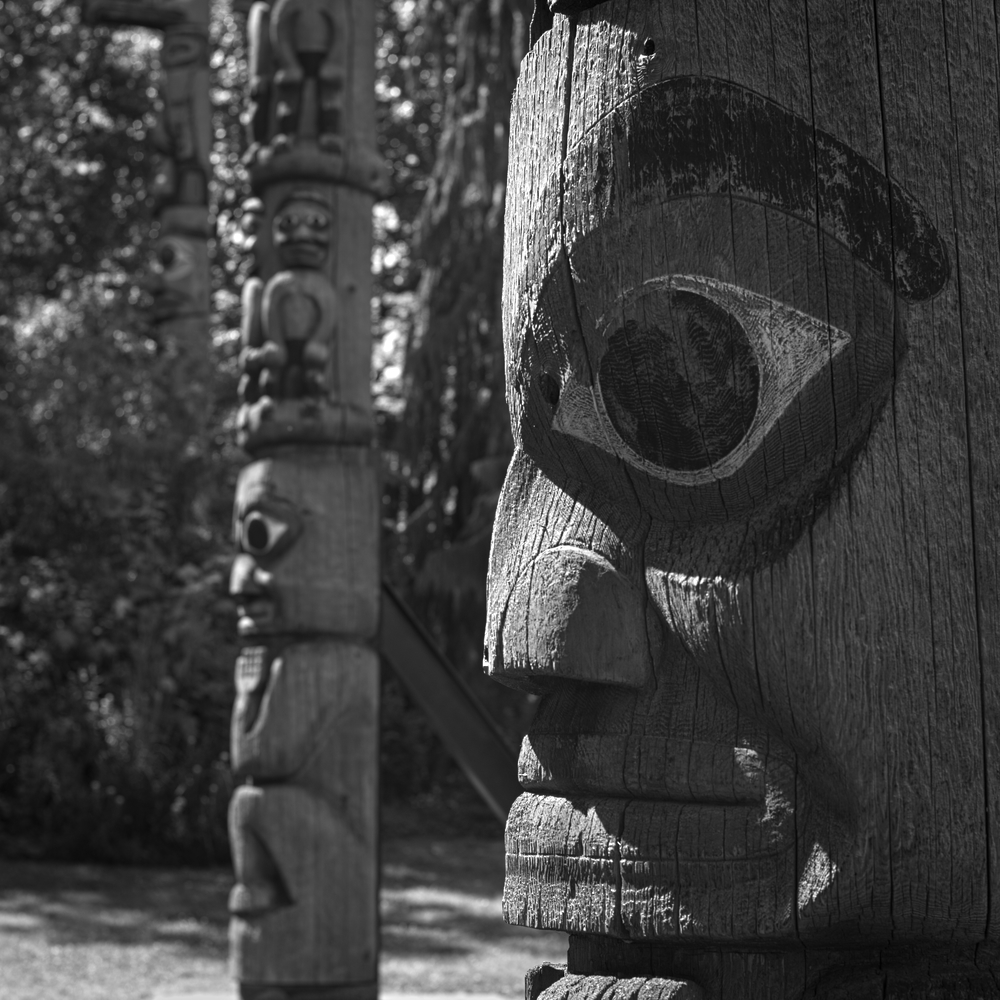
Totems, Thunderbird Park, Victoria, BC
Thunderbird Park, home of a fine collection of totem poles, is still free. It stands next door to the museum, and offers an excellent example of these fascinating objects. There is an artificiality about the display—the poles do not honor deceased chiefs, as they did in Alert Bay—but one can walk among them and take photos.
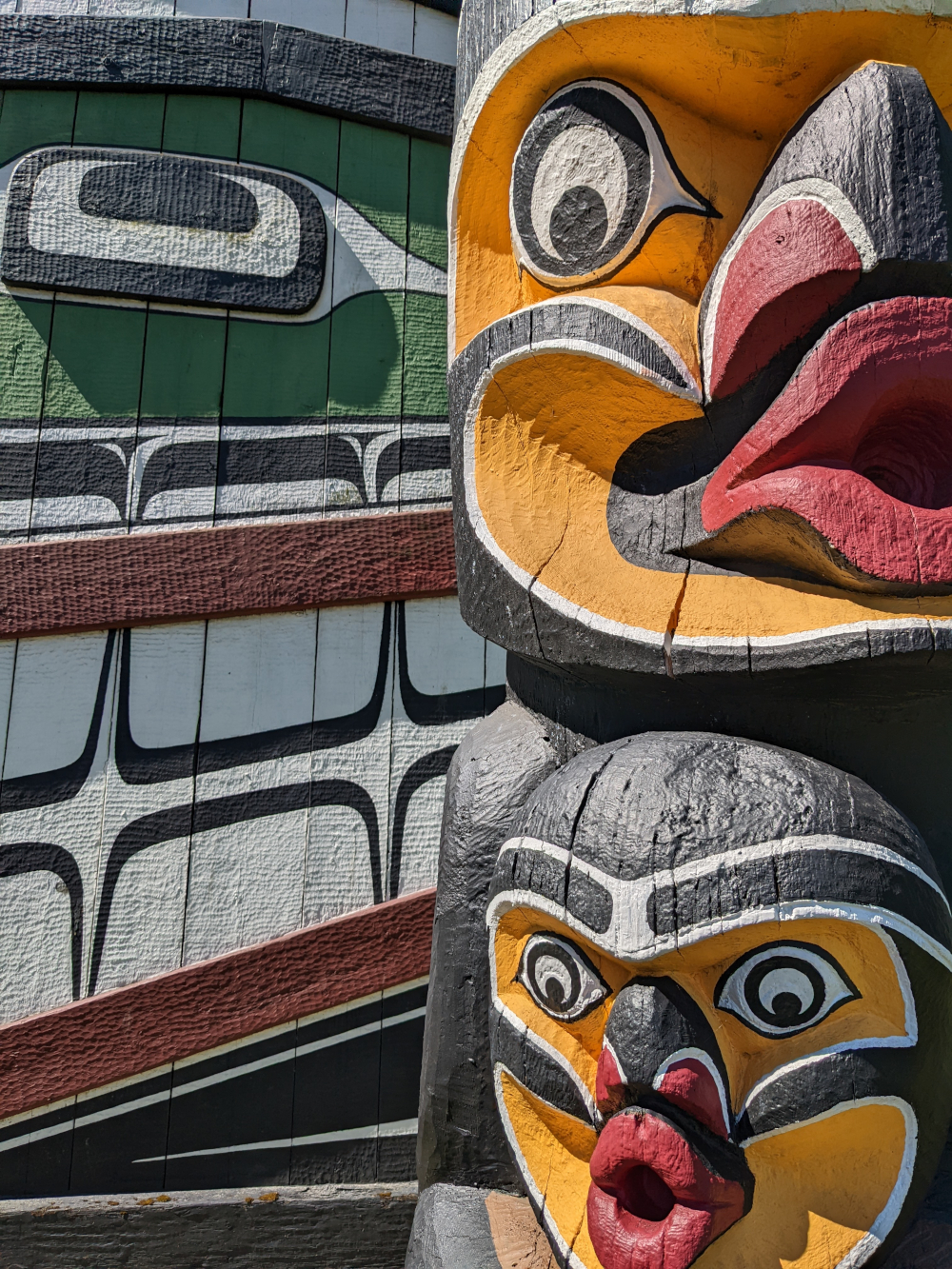
Totem and long house, Thunderbird Park, Victoria, BC
Our time in Canada drew to a close. Soon we reach the sad morning when we must board our ferry back to the United States.
The Coho docks in the heart of Victoria’s inner harbor, right across from the Empress Hotel and the Parliament building. The location is mysterious: the land consumed by a large parking lot is prime real estate. Arriving cars, trucks, and Winnebagos create a downtown traffic snarl four times each day. It would be far more sensible to relocate the Coho’s dock to the harbor entrance, where cruise ships disgorge arriving tourists.
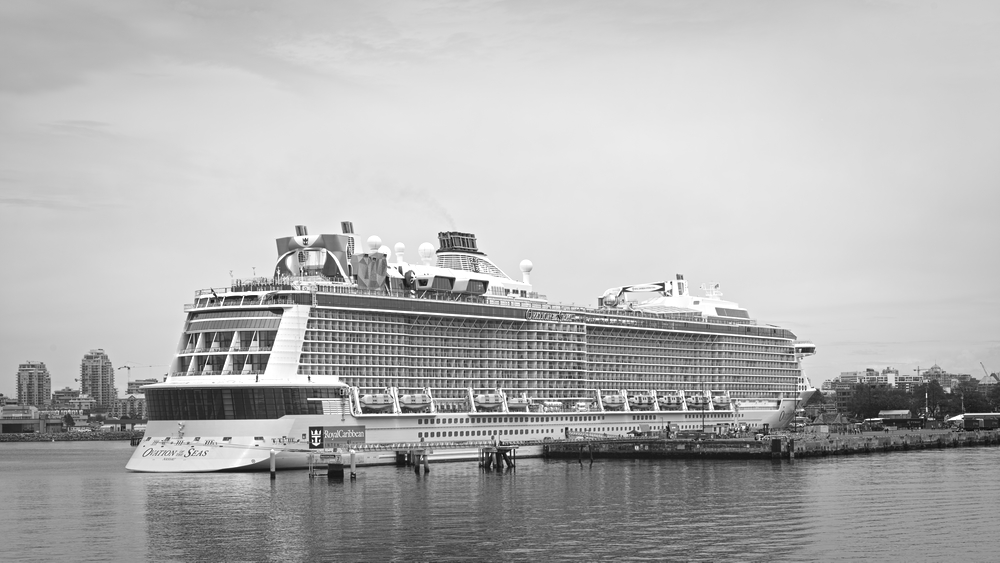
Plenty of room for ferry traffic out here
And while I’m fixing local problems, how about getting the museum reopened while keeping the five dollar tickets?
Our departure from Canada after six and a half weeks demands a closing soliloquy.
What did Canada mean to me? The last few blog entries are an attempt to answer this question. To summarize: I find this country delightful and have enjoyed my time here immensely. Should I ever stop roaming the world as the Peripatetic Historian, settling on Canada’s Vancouver Island is a likely possibility.
It is a land of stunning beauty and friendly people. I enjoyed the mountains and the sea, the close contact with nature and wildlife, and the smell of clean wet moist air. It is a temperate land, well suited to my aversion to extremes of heat and cold. It is a blessed land where people seem to enjoy each other and get along well. I imagine that Canada has its political problems, but they seem rather minor and inconsequential compared to the intractable divisions that characterize political discourse to the south. Canada was a respite from the politics of mutual intolerance, a sanctuary from the great team sport. It is not a perfect country, but it’s pretty close.

Canada, eh?
It is, in short, a place that would be very comfortable for me, a place where I would fit in and not disturb the water. Perhaps I will return and settle in the Great Green North.
If you are enjoying this series, why not subscribe to Richard's monthly newsletter, What's New in Old News? The Peripatetic Historian is on the road, roaming the world and compiling fresh adventures. Don't miss out. Click here to join the legions of above-average readers who have already subscribed.